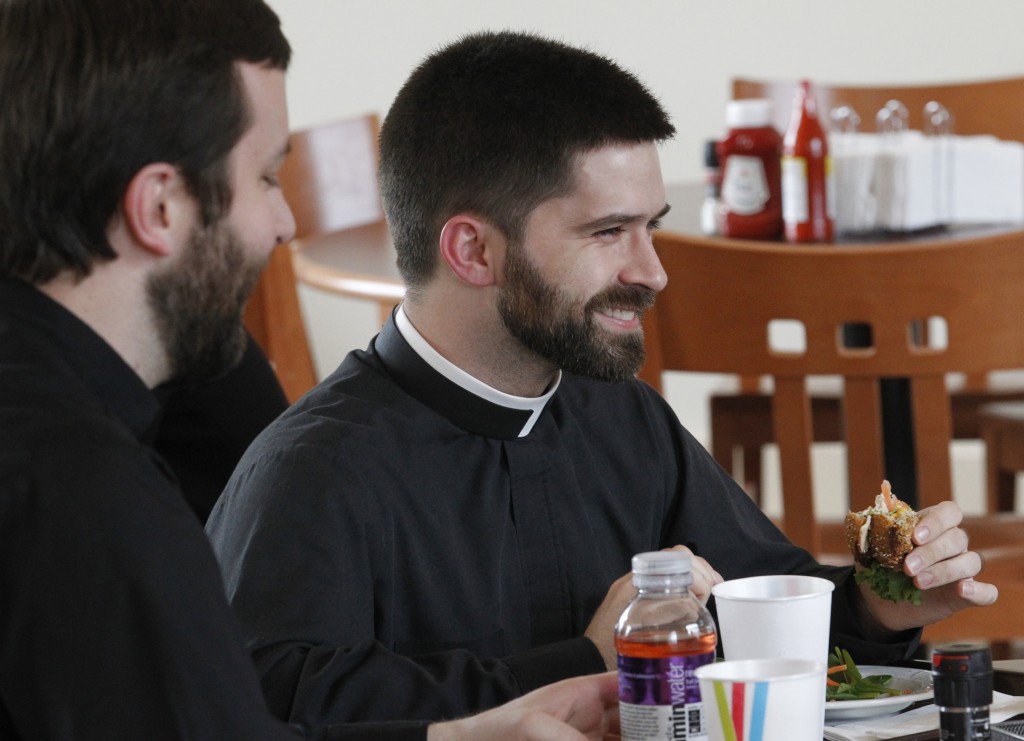
By Joseph Austin
Now-retired Pope Benedict XVI “has been pope my entire adult life,” said seminarian Kyle Doustou, who is studying to be a priest for the Diocese of Portland, Maine.
“My mature vocation was formed under his pontificate,” he told Catholic News Service.
Doustou and fellow seminarians Rhett Williams and Deacons Scott Holmer and Dustin Dought reflected on the pope’s eight-year pontificate and its effect on their lives as young Catholics in interviews at Theological College of The Catholic University of America in Washington.
They spoke to CNS Feb. 28, the last day of the Benedict papacy, and said they were sad when they found out that the first pope they had a chance to get to know was stepping down.
He was the “pope I was most aware of in my life,” said Deacon Holmer, who is studying to be a priest of the Washington Archdiocese. He entered the seminary in 2007, just two years after Pope Benedict’s election.
He has read so many writings of the pope in the seminary that he feels like he has come to know him on a personal level, he added.
Deacon Dought, a seminarian of the Diocese of Lafayette, La., was a “young senior in high school” when Blessed John Paul II died, he told CNS. Pope Benedict was the pontiff he got to know in his college years and in his time at the seminary.
Now ready to graduate and be ordained in June, he is sad that he will not be able to pray for the pope in the eucharistic prayer at Mass, he noted.
First-year seminarian Williams, from the Diocese of Charleston, S.C., started the “Ratzinger Fan Club” to read his writings, and was overjoyed when the former Cardinal Joseph Ratzinger ended up becoming pope in April 2005.
The retired pontiff was a “theological and intellectual pope, a lucid writer, a great teacher of the faith,” said Holmer, but most of all, he had a great “way to approach current biblical scholarship … with a lens of faith,” he added.
An author of 30 books, the pope was well-known for his wisdom and apologetics.
“Blessed John Paul II filled hearts, Pope Benedict XVI filled their minds,” said Doustou. What stuck out about the pope was “his devotion to Christian unity, his liturgical mind … (in shaping a) transcendent experience in the liturgy, and his humility,” he said.
He was a “humble saintly man,” added Doustou, who met him in 2008 when he came to Washington. A group of seminary students welcomed the pope to the Edward J. Pryzbyla center on the campus of Catholic University.
“I admire his humility,” said Deacon Dought. He realized that he is called to serve the church through a special vocation “in a new way through prayer,” he said.
Pope Benedict emphasized a personal encounter with Christ, he continued. He leaves a legacy in that “he longs for us to discover the face of God through prayer and through Christ,” he said.
“I don’t think he’s the kind of guy who would step down because he is tired,” remarked Deacon Holmer. “Almost like Jesus was called into the desert to pray,” so too was Pope Benedict “called to serve in a way efficacious for the sanctification of the church,” he said.
“As sad as it was, it was easy to accept knowing how tough it must be leading” a billion Catholics at 85 years old, said Doustou.
It really “shows the depth of his (prayer life) to see that as how the Spirit is calling him,” said Deacon Holmer.
“The Holy Spirit is in charge,” said Williams. While the conclave will not bring back Pope Benedict, the cardinals who will elect his successor will find someone who will uphold the “same teaching, but with a different personality,” he said.
“At the end of the day, the church is bigger than one personality or papacy,” said Doustou. The priorities of the church will change, but the overall mission of the church will continue, he said.
Given that Pope Benedict embraced Twitter, launching his own account and sending his first tweet last December, Williams remarked that it is likely the next pope will make more social media a priority. – CNS